Missed Fallen Leaves, About Dry Grasses, La Chimera and Poor Things. Maybe next year. Happy Holidays folks!
Pacifiction, Unrest, Trenque Lauquen, Dry Ground Burning, Showing Up ended up in my 2022 Favorite list.
1. La bête/The Beast - Bonello
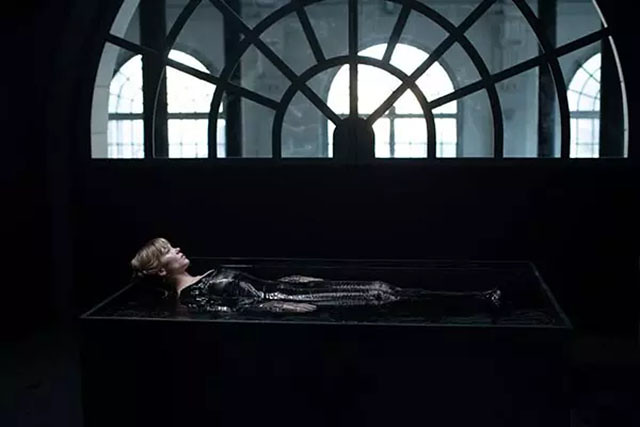 With arresting visuals and seductive filmmaking, Bonello has been chronicling our troubled 21st century like no other, with a string of films that are pretty, but not too pretty: House of Tolerance (sex workers rights), Nocturama (aimless angst of youth), Zombie Child (haunted by colonialism). and most recently Coma (Covid-19 lockdown). This time, Bonello is freely adapting Henry James's turn-of-the-century novella, The Beast of the Jungle. It tells of two would-be lovers forever beset by a sense of doom always hovering over them. It is a good parallel he is drawing with the state of things here and now. The dawn of the 20th century was an exciting time, both socially and politically. And the possibilities with the advancement in science and medicine were endless, at least for the citizens of the first world. But there was also volatility in every corner of the street. Violence, disease, extreme wealth and poverty and uncertainties everywhere.
With arresting visuals and seductive filmmaking, Bonello has been chronicling our troubled 21st century like no other, with a string of films that are pretty, but not too pretty: House of Tolerance (sex workers rights), Nocturama (aimless angst of youth), Zombie Child (haunted by colonialism). and most recently Coma (Covid-19 lockdown). This time, Bonello is freely adapting Henry James's turn-of-the-century novella, The Beast of the Jungle. It tells of two would-be lovers forever beset by a sense of doom always hovering over them. It is a good parallel he is drawing with the state of things here and now. The dawn of the 20th century was an exciting time, both socially and politically. And the possibilities with the advancement in science and medicine were endless, at least for the citizens of the first world. But there was also volatility in every corner of the street. Violence, disease, extreme wealth and poverty and uncertainties everywhere. Bonello taps on that anxiety with The Beast, which is a beast of a film, with all these hefty ideas swirling around and stylized to perfection. It is also greatly helped by mesmerizing performances by Léa Seydoux and George MacKay. This timeline-jumbled, massive film is set in three distinctive time periods (1904, 2014 and 2044); Bonello effortlessly shifts from one point to another.
2. A Little Love Package - Solnicki
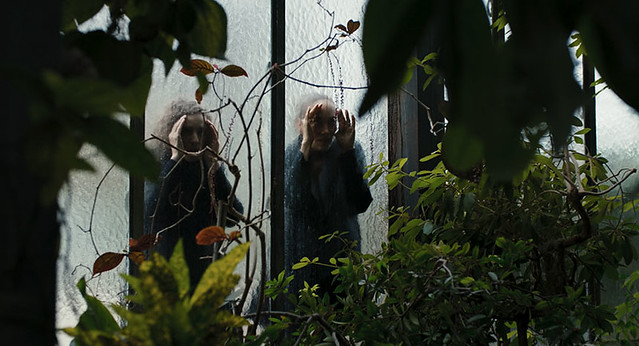 It's 2019. Vienna, the last bastion among the European cities where smoking in cafe has been allowed, bans smoking indoors. It's the end of an era. Two women, played by Angeliki Papoulia (Dogtooth) and Carmen Chaplin are looking for a house to buy. One is rich and very picky about her choices and the other, her interior designer is getting frustrated as her suggestions get rejected one after another. The rich woman's child wants private music lessons from a Korean pianist in Vienna, because she doesn't like the strictness of the music conservatory. After the rich woman finds an apartment, Carmen, the interior designer, travels back to her home in Malaga to visit her aging parents and argue with her sisters about the future of their home and parents.
It's 2019. Vienna, the last bastion among the European cities where smoking in cafe has been allowed, bans smoking indoors. It's the end of an era. Two women, played by Angeliki Papoulia (Dogtooth) and Carmen Chaplin are looking for a house to buy. One is rich and very picky about her choices and the other, her interior designer is getting frustrated as her suggestions get rejected one after another. The rich woman's child wants private music lessons from a Korean pianist in Vienna, because she doesn't like the strictness of the music conservatory. After the rich woman finds an apartment, Carmen, the interior designer, travels back to her home in Malaga to visit her aging parents and argue with her sisters about the future of their home and parents.
Shot beautifully by Rui Poças (Tabu, Zama, The Ornithologist), A Little Love Package is loosely associated ideas and images with free-flowing narrative. Argentine Gastón Solnicki's experiments with improvisation using, for the first time, professional actors and also their real family, bear interesting results that are oddly engaging and greatly liberating.
3. Musik - Schanelec
 Angela Schanelec's new, nearly silent film, simply titled Music, is supposedly 'freely' based on the Greek Myth of Oedipus. It might be the most enigmatic offering from the esteemed German director. But its depiction of melancholy and fragility of human life is nevertheless so beautiful and timeless, I can't help tearing up by the end.
Angela Schanelec's new, nearly silent film, simply titled Music, is supposedly 'freely' based on the Greek Myth of Oedipus. It might be the most enigmatic offering from the esteemed German director. But its depiction of melancholy and fragility of human life is nevertheless so beautiful and timeless, I can't help tearing up by the end.
4. Coma - Bonello
 From 9/11 to Iraq War to major economic crisis in 2008, to global warming then now to the pandemic, the Generation Z has been through a lot in their short semi-adult life. With its crazy kaleidoscopic images and sounds, the short film is an amalgam of what the short-attention-span generation has been going through psychologically and emotionally during the lockdown. But more than anything, Coma is a compassionate love letter from Bonello to his daughter Anna who just turned 18, and to her generation. We do not know what the future will bring. He ends with spectacularly frightening images of natural diasters- giant ice shelf melting off, abalanches and volcanic eruptions- some anthropocene and some not, either cases we have no control over anyway. Coma is more like Bonello saying, "Sorry kids, but at least I understand what you are going through, but the sun rises again tomorrow."
From 9/11 to Iraq War to major economic crisis in 2008, to global warming then now to the pandemic, the Generation Z has been through a lot in their short semi-adult life. With its crazy kaleidoscopic images and sounds, the short film is an amalgam of what the short-attention-span generation has been going through psychologically and emotionally during the lockdown. But more than anything, Coma is a compassionate love letter from Bonello to his daughter Anna who just turned 18, and to her generation. We do not know what the future will bring. He ends with spectacularly frightening images of natural diasters- giant ice shelf melting off, abalanches and volcanic eruptions- some anthropocene and some not, either cases we have no control over anyway. Coma is more like Bonello saying, "Sorry kids, but at least I understand what you are going through, but the sun rises again tomorrow."
5. Roter Himmel/Afire - Petzold
 The film tells a lot about the self-absorbed world in the face of climate change and global catastrophe unfolding. You might ask, 'Leon can't be that thick headed. How is he a friend with good natured, younger, optimistic Felix?' 'There's no chemistry between Leon and Nadja, how can he declare his love for her?' and so on. Afire is also about creative process and self-reflection. And it's beautifully, deliciously constructed by the master storyteller. It's as if Petzold saying get out of your head once in a while and look around you because if you don't, it might be already too late.
The film tells a lot about the self-absorbed world in the face of climate change and global catastrophe unfolding. You might ask, 'Leon can't be that thick headed. How is he a friend with good natured, younger, optimistic Felix?' 'There's no chemistry between Leon and Nadja, how can he declare his love for her?' and so on. Afire is also about creative process and self-reflection. And it's beautifully, deliciously constructed by the master storyteller. It's as if Petzold saying get out of your head once in a while and look around you because if you don't, it might be already too late.
6. Retour à Séoul/Return to Seoul - Chou
 First time actress Park Ji-min's performance is a revelation. She makes Freddie a strong willed, fascinating young woman in search of herself. Her magnetic presence makes her always watchable. Seeing from the perspective of an adoptee and a modern woman in a still very patriarchal society, Return to Seoul is a visceral journey toward self-discovery. The quiet ending reminds me a lot of Drive My Car. Return to Seoul has that novelistic quality about it that I like.
First time actress Park Ji-min's performance is a revelation. She makes Freddie a strong willed, fascinating young woman in search of herself. Her magnetic presence makes her always watchable. Seeing from the perspective of an adoptee and a modern woman in a still very patriarchal society, Return to Seoul is a visceral journey toward self-discovery. The quiet ending reminds me a lot of Drive My Car. Return to Seoul has that novelistic quality about it that I like.
7. Eureka - Alonso
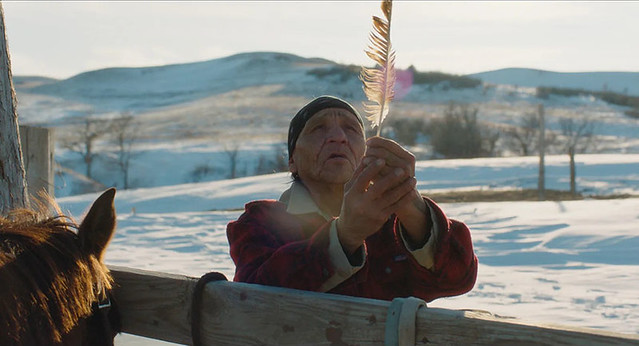 Argentine filmmaker, Lisandro Alonso, breaks 9-year silence with Eureka, after Viggo Mortensen starring meta-western Jauja. In an episodic structure, the film freely contemplates the state of indigenous people of the vast American continents, the past and present, as well as their uneasy relationship with cinema. It's perhaps his most expansive and ambitious film to date. He digs deep into the distorted representation and history, the effect of colonialism and the influence of Western culture that displaces the natives who are left out of place and out of time. Using his minimalist, elemental way of filmmaking, combined with Deleuzean look at time-image non-linear approach and Native American spirituality, Eureka is a deeply contemplative, perplexing film.
Argentine filmmaker, Lisandro Alonso, breaks 9-year silence with Eureka, after Viggo Mortensen starring meta-western Jauja. In an episodic structure, the film freely contemplates the state of indigenous people of the vast American continents, the past and present, as well as their uneasy relationship with cinema. It's perhaps his most expansive and ambitious film to date. He digs deep into the distorted representation and history, the effect of colonialism and the influence of Western culture that displaces the natives who are left out of place and out of time. Using his minimalist, elemental way of filmmaking, combined with Deleuzean look at time-image non-linear approach and Native American spirituality, Eureka is a deeply contemplative, perplexing film.
8. Nu aștepta prea mult de la sfârșitul lumii/Do Not Expect Too Much of the End of the World - Jude
 Biting and thought provoking, Don't Expect Too Much is a perfect survey of the state of our lives right now. Jude, along with Assayas and Bonello, is a master chronicler of ever changing, ever so complicated world we can't make sense of anymore. It's fun, it's tragic. All we can do is go along with the flow, like Taoists saying.
Biting and thought provoking, Don't Expect Too Much is a perfect survey of the state of our lives right now. Jude, along with Assayas and Bonello, is a master chronicler of ever changing, ever so complicated world we can't make sense of anymore. It's fun, it's tragic. All we can do is go along with the flow, like Taoists saying.
9. Anatomie d'une chute/Anatomy of a Fall - Triet
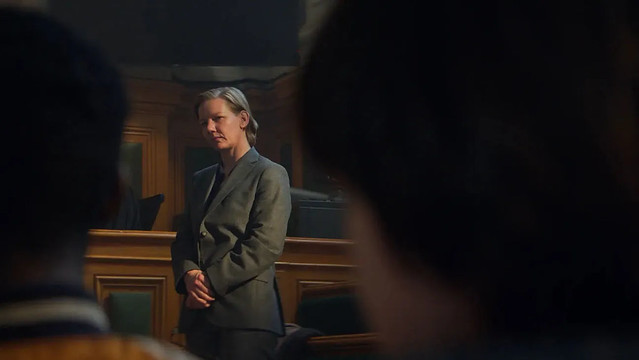 Well tuned and balanced, Anatomie d'une chute is a revealing film about this day and age where patriarchy and everyday sexism is slowly losing its grip on our society (or lets hope). Sandra Hüller again, is fast becoming the heroine we need in this social climate. Also, Triet, as with Sybil, examines the nature of art and literature- the art immitating life, plagiarism and even autofiction in a very captivating way.
Well tuned and balanced, Anatomie d'une chute is a revealing film about this day and age where patriarchy and everyday sexism is slowly losing its grip on our society (or lets hope). Sandra Hüller again, is fast becoming the heroine we need in this social climate. Also, Triet, as with Sybil, examines the nature of art and literature- the art immitating life, plagiarism and even autofiction in a very captivating way.
10. Perfect Days - Wenders
 There's a very zen-like quality in Perfect Days. Is that Wenders converting the Buddhism late in life? There's a scene where two grown men, one dying of cancer, playing shadow tag, like little children. Perfect Days is a guiless movie that makes you think about enjoying simple things in life. Forget about the complicated life you are leading in a complicated world for a second. Play childish games once in a while and enjoy the moment.
There's a very zen-like quality in Perfect Days. Is that Wenders converting the Buddhism late in life? There's a scene where two grown men, one dying of cancer, playing shadow tag, like little children. Perfect Days is a guiless movie that makes you think about enjoying simple things in life. Forget about the complicated life you are leading in a complicated world for a second. Play childish games once in a while and enjoy the moment.
11. Retratos fantasmas/Pictures of Ghosts - Mendonça Filho
 Pictures of Ghosts is a loving, intimate documentary on ephemeral nature of our lives. Our loved ones grow old and die, buildings get torn down, video footages disintegrate, but there is evidence of those lives lived and experienced all over, if you know where to look. Combining his own experience and his love of cinema, Mendonça Filho serves as our expert guide to his beloved city of Recife. The movie ends with whimsical taxi ride, throwing shades on Hollywood's superhero movies. The 80s Michael Mann vibe with night lights reflecting on the car, as it rides the bridge at night with smooth jazz - reminds the audience that the Brazilian director undoubtedly grew up loving the 80s Hollywood cinema.
Pictures of Ghosts is a loving, intimate documentary on ephemeral nature of our lives. Our loved ones grow old and die, buildings get torn down, video footages disintegrate, but there is evidence of those lives lived and experienced all over, if you know where to look. Combining his own experience and his love of cinema, Mendonça Filho serves as our expert guide to his beloved city of Recife. The movie ends with whimsical taxi ride, throwing shades on Hollywood's superhero movies. The 80s Michael Mann vibe with night lights reflecting on the car, as it rides the bridge at night with smooth jazz - reminds the audience that the Brazilian director undoubtedly grew up loving the 80s Hollywood cinema.
12. Augure/Omen - Baloji
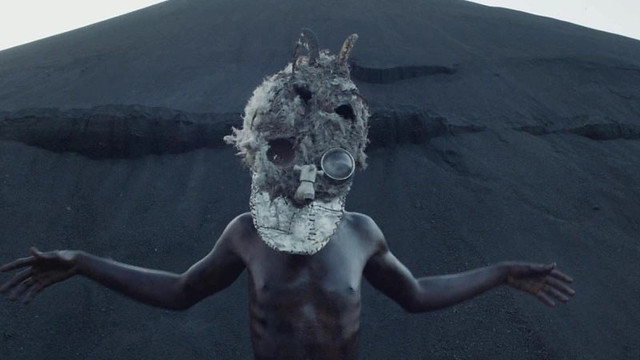 With multiple storylines and characters, Omen introduces a different kind of storytelling that the Western filmmaking is not used to. Much like Anisia Uzeyman and Saul Williams’s Neptune Frost couple years back, the film is not bound to a straightforward narrative. Presenting a multicultural society in flux, where things clash with each other for dominance, the film’s colors and texture vie for your attention. It takes everything from everywhere – from the Democratic Republic of Congo, South Africa, and multiple other African nations, even from the Creole culture of Louisiana. The film is mainly told through sensations and visual poetry. It’s in Mujila’s breastfeeding the river in the beginning of the film with purple milk as purple milk slowly spills out. It’s in a decrepit school bus full of pink dress wearing street urchins violently being towed. It’s in a group of women mourners crying until the floor of the house is ankle deep with their tears. It’s in witch doctor trying to exorcise a couple with sexually transmitted disease by painting their bodies and pelting them with a tree branch soaked in palm oil. Omen is a truly unique experience to be had. Using the magical realism and symbolism steeped in tradition old and new, the film is a kaleidoscopic picture of bustling Africa that is here and now.
With multiple storylines and characters, Omen introduces a different kind of storytelling that the Western filmmaking is not used to. Much like Anisia Uzeyman and Saul Williams’s Neptune Frost couple years back, the film is not bound to a straightforward narrative. Presenting a multicultural society in flux, where things clash with each other for dominance, the film’s colors and texture vie for your attention. It takes everything from everywhere – from the Democratic Republic of Congo, South Africa, and multiple other African nations, even from the Creole culture of Louisiana. The film is mainly told through sensations and visual poetry. It’s in Mujila’s breastfeeding the river in the beginning of the film with purple milk as purple milk slowly spills out. It’s in a decrepit school bus full of pink dress wearing street urchins violently being towed. It’s in a group of women mourners crying until the floor of the house is ankle deep with their tears. It’s in witch doctor trying to exorcise a couple with sexually transmitted disease by painting their bodies and pelting them with a tree branch soaked in palm oil. Omen is a truly unique experience to be had. Using the magical realism and symbolism steeped in tradition old and new, the film is a kaleidoscopic picture of bustling Africa that is here and now.
13. Godland - Pálmason
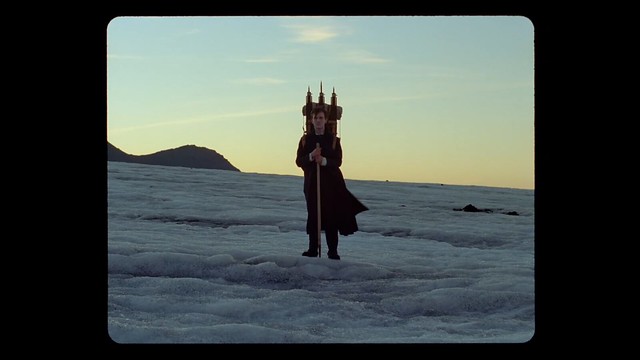 With its circle of life ending, Godland is a contemplation of us humans’ fleeting existence on earth. In a true Herzogian sense, with large brushstrokes, Pálmason draws a grand allegory that we are after all, elemental. And it's magnificent.
With its circle of life ending, Godland is a contemplation of us humans’ fleeting existence on earth. In a true Herzogian sense, with large brushstrokes, Pálmason draws a grand allegory that we are after all, elemental. And it's magnificent.
14. Human Flowers of Flesh - Wittmann
 We see forever undulating sea on the deck and through the round windows from inside the ship, the horizontal sea level bobbing up and down as the ship sails through the waves. Just like her first feature Drift, Helena Wittmann presents long stretches of these scenes that has its own hypnotic rhythm. The ship crew converse in many different languages - English, German, Arabic, Portuguese, Greek and so on, yet nothing is explained about their background. Instead, Wittmann concentrates on the film's visually blissful moments - the shimmering sunlight reflected on the waves just below the deck, a piece of reef Ida brought from Antigua being passed around the crew, a dance party on the deck at night with colorful flags and lights gleaming and the blue sea as Ida (Angeliki Papoulia) swims back and forth. There are some show stoppers like the camera plunging into the blue depth to find a wreckage of a downed WWII plane at the bottom of the ocean floor. The film's full of sensual images that recalls Claire Denis films. But I think Wittmann's aim here is different. In her hands, the gleaming water and the sun are the subjects. They are vital to human life and we see that in Ida and her crew's uneroticised browned skin.
We see forever undulating sea on the deck and through the round windows from inside the ship, the horizontal sea level bobbing up and down as the ship sails through the waves. Just like her first feature Drift, Helena Wittmann presents long stretches of these scenes that has its own hypnotic rhythm. The ship crew converse in many different languages - English, German, Arabic, Portuguese, Greek and so on, yet nothing is explained about their background. Instead, Wittmann concentrates on the film's visually blissful moments - the shimmering sunlight reflected on the waves just below the deck, a piece of reef Ida brought from Antigua being passed around the crew, a dance party on the deck at night with colorful flags and lights gleaming and the blue sea as Ida (Angeliki Papoulia) swims back and forth. There are some show stoppers like the camera plunging into the blue depth to find a wreckage of a downed WWII plane at the bottom of the ocean floor. The film's full of sensual images that recalls Claire Denis films. But I think Wittmann's aim here is different. In her hands, the gleaming water and the sun are the subjects. They are vital to human life and we see that in Ida and her crew's uneroticised browned skin.
15. How to Blow Up a Pipeline - Goldhaber
 The matter of fact presentation of bomb making and careful planning are the meat of the film. How to Blow Up a Pipeline plays out like a great little thriller. Their meticulous plan hit a snag when the rope holding the heavy barrel containing the bomb breaks, but despite the setback, they carry out the attack. The twist at the end is well earned as well. How to Blow Up the Pipeline is a compelling film. It is a justifiably angry film for the generation out of time and out of options.
The matter of fact presentation of bomb making and careful planning are the meat of the film. How to Blow Up a Pipeline plays out like a great little thriller. Their meticulous plan hit a snag when the rope holding the heavy barrel containing the bomb breaks, but despite the setback, they carry out the attack. The twist at the end is well earned as well. How to Blow Up the Pipeline is a compelling film. It is a justifiably angry film for the generation out of time and out of options.
16. Rewind & Play - Gomis
 At the end of his European tour in 1969, Thelonious Monk appeared in Jazz Portrait, a French TV program. Director Alain Gomis (Félicité) gets a hold of the rushes of that taping & plays around with some very candid moments that reveal how Monk was viewed vs. how he carried himself in real life. The best part is obviously him playing ‘round Midnight, sweating profusely, as if nothing else existed around him but the grand piano.
At the end of his European tour in 1969, Thelonious Monk appeared in Jazz Portrait, a French TV program. Director Alain Gomis (Félicité) gets a hold of the rushes of that taping & plays around with some very candid moments that reveal how Monk was viewed vs. how he carried himself in real life. The best part is obviously him playing ‘round Midnight, sweating profusely, as if nothing else existed around him but the grand piano.
17. Passages - Sachs
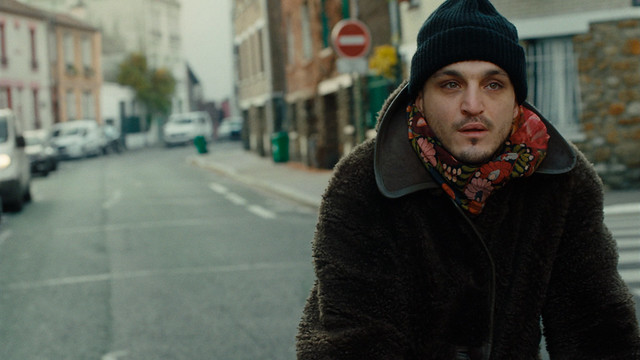 Past experiences shape who we are. It's the reflection of the things past that makes one grow as a person. Therefore, Ira Sachs's new film Passages, is a snapshot of a person going through that process of growth, for better or worse. It's a mature film in more ways than one and a realistic look at modern relationships. Passages highlights the true acting talent of great German actor Franz Rogowski (Transit, Undine, Great Freedom) because he is phenomenal in this sexually charged character study.
Past experiences shape who we are. It's the reflection of the things past that makes one grow as a person. Therefore, Ira Sachs's new film Passages, is a snapshot of a person going through that process of growth, for better or worse. It's a mature film in more ways than one and a realistic look at modern relationships. Passages highlights the true acting talent of great German actor Franz Rogowski (Transit, Undine, Great Freedom) because he is phenomenal in this sexually charged character study.
18. Le otto montagne/The Eight Mountains - Groenigen, Vandersmeersch
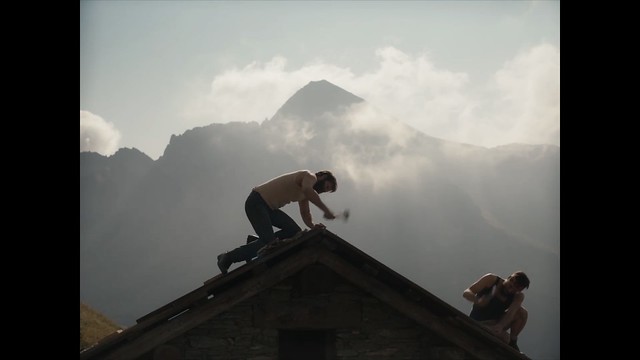 The strength of The Eight Mountains is its complex depiction of a male friendship. It speaks volumes in their knowing glances and silences as they spend time together up in the mountains. Our circumstances change but the mountains don't. It illustrates men's ultimate desire and to retreat from the human world and finding it futile. As they grow older, Pietro and Bruno understand this connundrum, and take refuge in each other's company. This all sounds corny as hell in words, but van Gronigen and Vandermeersch's earnest approach works beautifully, with awe-inspiring views of nature and superb, stoic acting by the two leads. Swedish singer Daniel Norgren's soulful, melancholic soundtrack does here what Leonard Cohen did for McCabe & Mrs. Miller.
The strength of The Eight Mountains is its complex depiction of a male friendship. It speaks volumes in their knowing glances and silences as they spend time together up in the mountains. Our circumstances change but the mountains don't. It illustrates men's ultimate desire and to retreat from the human world and finding it futile. As they grow older, Pietro and Bruno understand this connundrum, and take refuge in each other's company. This all sounds corny as hell in words, but van Gronigen and Vandermeersch's earnest approach works beautifully, with awe-inspiring views of nature and superb, stoic acting by the two leads. Swedish singer Daniel Norgren's soulful, melancholic soundtrack does here what Leonard Cohen did for McCabe & Mrs. Miller.
19. Remembering Every Night - Kiyohara
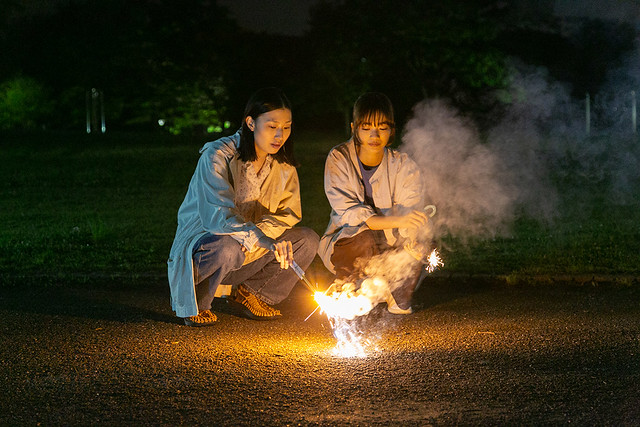 Remembering Every Night captures the unseen-world of delicate web that connects us all together. The film's very much in the same vein as Hamaguchi Ryusuke's 2021 crowd pleaser, Wheel of Fortune and Fantasy but from a different, quieter, less punctuated angle. The film's nostalgic tone, imbued with contemplation of time, memories, loss of memories and longing, lingers long after its credits roll.
Remembering Every Night captures the unseen-world of delicate web that connects us all together. The film's very much in the same vein as Hamaguchi Ryusuke's 2021 crowd pleaser, Wheel of Fortune and Fantasy but from a different, quieter, less punctuated angle. The film's nostalgic tone, imbued with contemplation of time, memories, loss of memories and longing, lingers long after its credits roll.
20. Tótem - Avilés
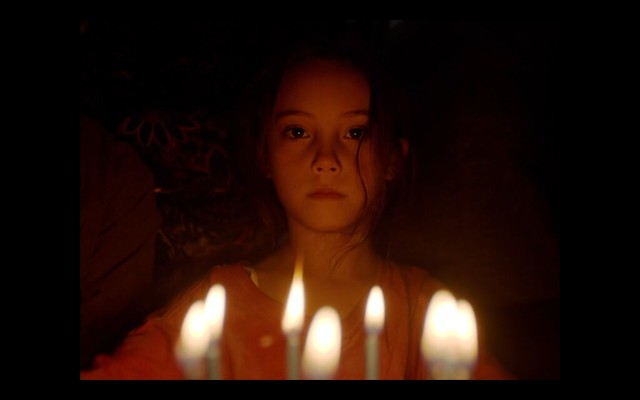 We often try our best to shield children from the ugly world of grownups: responsibilites, money, parenthood, guilt.... Young Naíma Sentís, like Anna Torres before her in Victor Erice's Spirit of the Beehive, shines as a young, innocent child full of life, but who is old enough to realize that there's something awry about adulthood. Death is something we experience more and more as we grow older. It changes you and perhaps makes you grow up faster. The ending shot of young Sol looking straigth through the birthday cake candles, conveys that understanding without saying any words. Delicate and infinitely patient in her storytelling, Avilés let the film play out reach where it ends as it is supposed to. A beautiful film.
We often try our best to shield children from the ugly world of grownups: responsibilites, money, parenthood, guilt.... Young Naíma Sentís, like Anna Torres before her in Victor Erice's Spirit of the Beehive, shines as a young, innocent child full of life, but who is old enough to realize that there's something awry about adulthood. Death is something we experience more and more as we grow older. It changes you and perhaps makes you grow up faster. The ending shot of young Sol looking straigth through the birthday cake candles, conveys that understanding without saying any words. Delicate and infinitely patient in her storytelling, Avilés let the film play out reach where it ends as it is supposed to. A beautiful film.